Novel degenerative and developmental defects in a zebrafish model of mucolipidosis type IV
- PMID: 28449103
- PMCID: PMC5886147
- DOI: 10.1093/hmg/ddx158
Novel degenerative and developmental defects in a zebrafish model of mucolipidosis type IV
Abstract
Mucolipidosis type IV (MLIV) is a lysosomal storage disease characterized by neurologic and ophthalmologic abnormalities. There is currently no effective treatment. MLIV is caused by mutations in MCOLN1, a lysosomal cation channel from the transient receptor potential (TRP) family. In this study, we used genome editing to knockout the two mcoln1 genes present in Danio rerio (zebrafish). Our model successfully reproduced the retinal and neuromuscular defects observed in MLIV patients, indicating that this model is suitable for studying the disease pathogenesis. Importantly, our model revealed novel insights into the origins and progression of the MLIV pathology, including the contribution of autophagosome accumulation to muscle dystrophy and the role of mcoln1 in embryonic development, hair cell viability and cellular maintenance. The generation of a MLIV model in zebrafish is particularly relevant given the suitability of this organism for large-scale in vivo drug screening, thus providing unprecedented opportunities for therapeutic discovery.
Published by Oxford University Press 2017. This work is written by US Government employees and is in the public domain in the US.
Figures
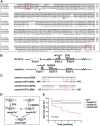
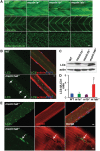

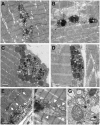
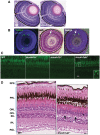

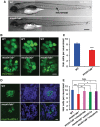
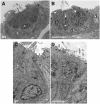


Similar articles
-
Characterization and expression analysis of mcoln1.1 and mcoln1.2, the putative zebrafish co-orthologs of the gene responsible for human mucolipidosis type IV.Int J Dev Biol. 2013;57(1):85-93. doi: 10.1387/ijdb.120033gb. Int J Dev Biol. 2013. PMID: 23585356
-
The molecular basis of mucolipidosis type IV.Curr Mol Med. 2002 Aug;2(5):445-50. doi: 10.2174/1566524023362276. Curr Mol Med. 2002. PMID: 12125810 Review.
-
Early evidence of delayed oligodendrocyte maturation in the mouse model of mucolipidosis type IV.Dis Model Mech. 2020 Jul 30;13(7):dmm044230. doi: 10.1242/dmm.044230. Dis Model Mech. 2020. PMID: 32586947 Free PMC article.
-
Association of luteal cell degeneration and progesterone deficiency with lysosomal storage disorder mucolipidosis type IV in Mcoln1-/- mouse model†.Biol Reprod. 2019 Oct 25;101(4):782-790. doi: 10.1093/biolre/ioz126. Biol Reprod. 2019. PMID: 31317194 Free PMC article.
-
Mucolipidosis type IV: an update.Mol Genet Metab. 2011 Nov;104(3):206-13. doi: 10.1016/j.ymgme.2011.06.006. Epub 2011 Jun 16. Mol Genet Metab. 2011. PMID: 21763169 Free PMC article. Review.
Cited by
-
Dysregulation of Microglial Function Contributes to Neuronal Impairment in Mcoln1a-Deficient Zebrafish.iScience. 2019 Mar 29;13:391-401. doi: 10.1016/j.isci.2019.02.031. Epub 2019 Mar 2. iScience. 2019. PMID: 30897512 Free PMC article.
-
Hexb enzyme deficiency leads to lysosomal abnormalities in radial glia and microglia in zebrafish brain development.Glia. 2019 Sep;67(9):1705-1718. doi: 10.1002/glia.23641. Epub 2019 May 29. Glia. 2019. PMID: 31140649 Free PMC article.
-
Astaxanthin prevents bone loss in osteoporotic rats with palmitic acid through suppressing oxidative stress.Redox Rep. 2024 Dec;29(1):2333096. doi: 10.1080/13510002.2024.2333096. Epub 2024 Apr 16. Redox Rep. 2024. PMID: 38623993 Free PMC article.
-
Modeling Lysosomal Storage Diseases in the Zebrafish.Front Mol Biosci. 2020 May 6;7:82. doi: 10.3389/fmolb.2020.00082. eCollection 2020. Front Mol Biosci. 2020. PMID: 32435656 Free PMC article. Review.
-
The role of Niemann-Pick type C2 in zebrafish embryonic development.Development. 2021 Apr 1;148(7):dev194258. doi: 10.1242/dev.194258. Epub 2021 Apr 15. Development. 2021. PMID: 33722902 Free PMC article.
References
-
- Amir N., Zlotogora J., Bach G. (1987) Mucolipidosis type IV: clinical spectrum and natural history. Pediatrics, 79, 953–959. - PubMed
-
- Bach G. (2001) Mucolipidosis type IV. Mol. Genet. Metab., 73, 197–203. - PubMed
-
- Sun M., Goldin E., Stahl S., Falardeau J.L., Kennedy J.C., Acierno J.S. Jr., Bove C., Kaneski C.R., Nagle J., Bromley M.C.. et al. (2000) Mucolipidosis type IV is caused by mutations in a gene encoding a novel transient receptor potential channel. Hum. Mol. Genet., 9, 2471–2478. - PubMed
-
- Altarescu G., Sun M., Moore D.F., Smith J.A., Wiggs E.A., Solomon B.I., Patronas N.J., Frei K.P., Gupta S., Kaneski C.R.. et al. (2002) The neurogenetics of mucolipidosis type IV. Neurology, 59, 306–313. - PubMed
MeSH terms
Substances
LinkOut - more resources
Full Text Sources
Other Literature Sources
Molecular Biology Databases

